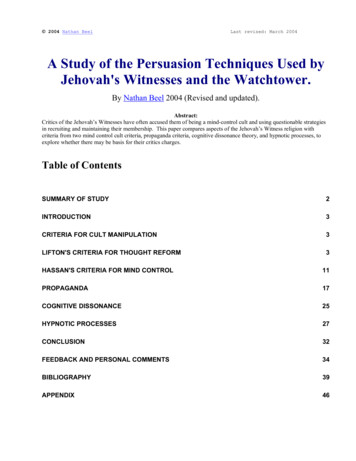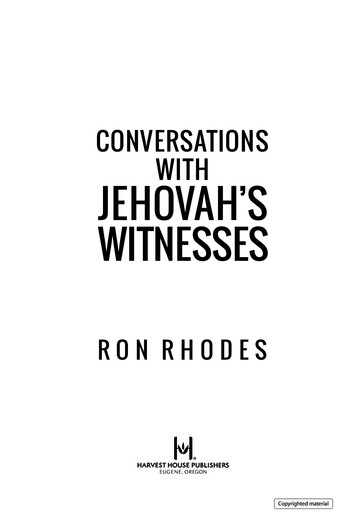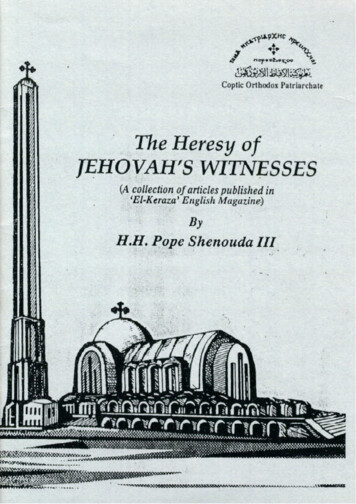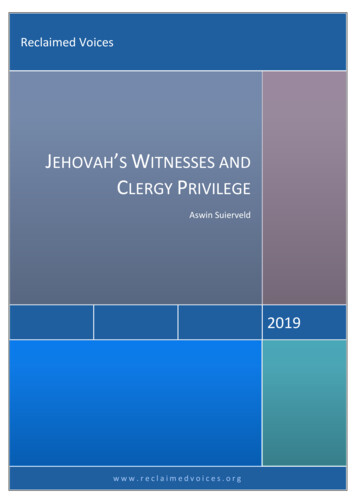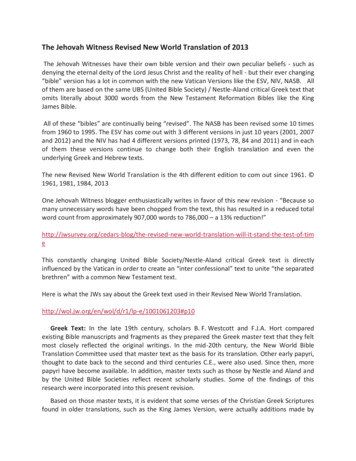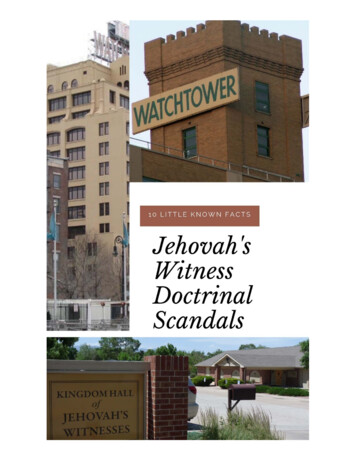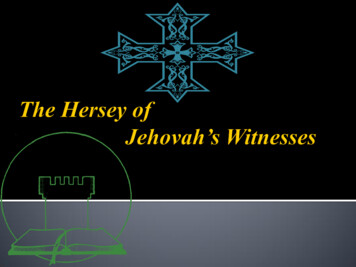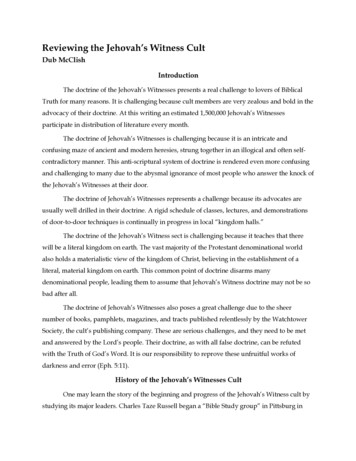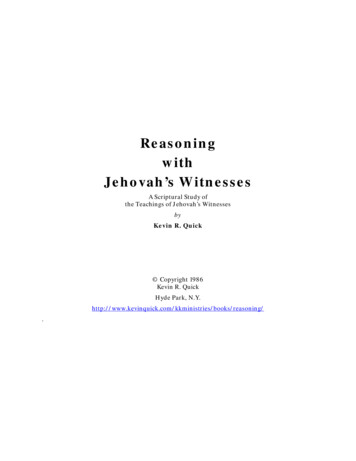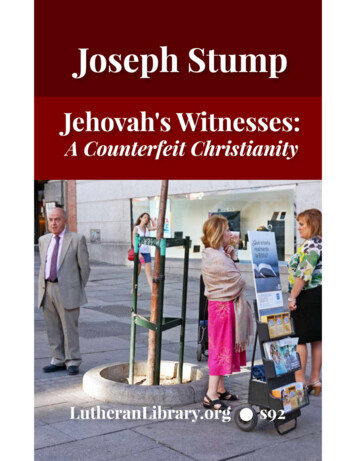
Transcription
Jehovah’s Witnesses: ACounterfeit Christianity1
Also Available from LutheranLibrary.orgTheosophy and New Thought by Henry Clay SheldonModern Religious Liberalism by John HorschChurches And Sects Of Christendom by J. L. Neve2
About The Lutheran LibraryThe Lutheran Library is a non-profit publisher of good Christian books. All areavailable in a variety of formats for use by anyone for free or at very little cost. There arenever any licensing fees.We are Bible believing Christians who subscribe wholeheartedly to the AugsburgConfession as an accurate summary of Scripture, the chief article of which is Justificationby Faith. Our purpose is to make available solid and encouraging material to strengthenbelievers in Christ.Prayers are requested for the next generation, that the Lord will plant in them a love ofthe truth, such that the hard-learned lessons of the past will not be forgotten.Please let others know of these books and this completely volunteer endeavor. May Godbless you and keep you, help you, defend you, and lead you to know the depths of Hiskindness and love.3
Jehovah’s Witnesses: ACounterfeit ChristianityBy Joseph StumpPRESIDENT OF NORTHWESTERN LUTHERAN THEOLOGICAL SEMINARYPhiladelphiaUNITED LUTHERAN PUBLICATION HOUSE 1923 / 2019(CC BY 4.0)LutheranLibrary.org4
ContentsAlso Available from LutheranLibrary.orgAbout The Lutheran LibraryContentsInitial NoteJehovah’s Witnesses: A Counterfeit Christianity1. Errors Concerning Man.2. Errors Concerning Sin and Its Penalty.3. Denial of the Trinity.4. Denial of the Resurrection of Christ.Copyright NoticeHow Can You Find Peace With God?BenedictionMore Than 100 Good Christian Books For You To Download And Enjoy5
Initial NoteThe substance of this pamphlet was prepared some years ago. Incompliance with a request for its publication, it has been revised and is nowsubmitted to the press, in the hope that it may be of some service to theChurch in guarding her members against one of the dangerous heresies ofthe day.6
Jehovah’s Witnesses: ACounterfeit ChristianityRUSSELLISM [Jehovah’s Witnesses] is a counterfeit which seeks to haveitself accepted in lieu of real Christianity. It is unbelief and materialismmasquerading under the guise of the true religion. It seeks to establish itselfby a great show of Scriptural proof, and disseminates its teachings bymeans of the lecture platform, books, religious publications, articles in thedaily press and even by moving pictures. It is not a defective system ofChristianity or a mingling of truth and error, but it is a complete system oferror seeking to get itself accepted in the place of the truth. It is not merely,as some may imagine, a curious form of millenialism, but an anti-Christianreligion. It distorts or denies all the doctrines of the Christian Church. Andit asserts that the unbelief, materialism and anti-Christian doctrines which itsets forth are the very teachings of the Bible itself. It is a far-reaching, wellorganized and determined effort to subvert the Gospel and to substituteerror in its place.It is a mistake to suppose that Russellism is a minor peril which maysafely be ignored. It is wily and insidious. It seeks to introduce its books “toChristian people of all denominations” on the plea that its so-called“Studies in the Scripture” are reliable helps to the study of God’s Word. Itoffers the whole set of six books at a very low price, and gives them awayfor nothing if people are not able to pay for them. It is claimed on the titlepage of Volume I that as far back as 1907 that book already had acirculation of over two million copies; and since then it is claimed that thecirculation has more than doubled. We are assured that the books have beentranslated into a dozen different languages. Colporteurs cover the land, anddistribute books, tracts and papers from house to house.Russell’s name does not appear in the title of any of his books. His firstbook was published under the title “Millenial-Dawn, or the Plan of theAges.” Now the books are published under the seductive title “Studies in7
the Scriptures.” His organization was first called “The Tower PublishingCo,” then “The Watch Tower Bible and Tract Society;” and then “TheInternational Bible Students’ Association.” The books are called “AHelping Hand for Bible Students.” The author of these books accuses thelearned translators of the Bible of ignorance or dishonesty (Vol. V, pp. 333,354). And it is well known that Russellite lecturers assert that the ministersof the Christian Church do not themselves believe what they preach, and aredeliberately “pulling the wool over people’s eyes.”Russellism practically asserts that through all the centuries past God haskept the world and the Church in utter ignorance on the most importantdoctrines of Scripture, and has only made them known through Russellwithin the last fifty years. (Vol. I, p 24; IV, p. 613.)The peril of Russellism lies not in any apparent ability to gain a largenumber of adherents for its complete system, but in the fact that where it isreceived, even only in part, it undermines belief in the existence of the souland in eternal retribution for sin. Those who accept even this much of itsteachings become persons for whom the Gospel loses all power of appeal;for what appeal can the Gospel make to those who believe that they have nosoul and that there is no eternal death from which they need to be saved?Though anti-Christian in all its teachings, Russellism makes a free use ofChristian words and phrases. Much of its talk sounds like that of theChristian Church. But when Russellism uses Christian words and phraseswith which we have been familiar from childhood, we must bear in mindthat it understands them in an entirely different sense from that in which weuse them. To the Christian the words “Christ the only begotten Son of God”mean that Christ is the true and real Son of God from eternity; but whenRussellism uses the same words, it does not mean the same thing. ForRussellism denies that Jesus Christ is the true Son of God, and says that Heis a creature. It freely uses our customary Christian phraseology, butempties it of its real meaning and understands it in a totally different sense.To know what Russellism really is, we must not depend upon the publicutterances of its lecturers or on partial presentations of its teachings inpamphlets, but we must examine the authoritative statements of itsteachings. These are contained in its so called “Studies in the Scripture.” Ofthese Volume V presents its teachings in the most systematic form. While itmay not appear so to the casual hearer of a Russellite lecturer, it is a fact, asthese volumes show, that Russellism denies the doctrine of the Holy Trinity,8
the deity of Christ, the personality of the Holy Spirit, the atonement, and theresurrection of Jesus, as well as the existence of the soul, the reality of hell,and the certainty of eternal retribution. It teaches that the natural physicaldeath is the full penalty of sin; that man becomes extinct at death; that Jesusdied and became extinct; that Jesus did not rise from the dead, but that anew spirit expressly created for the purpose appeared to the disciples anddeceived them into believing that he was Jesus risen from the dead; that thebody of Jesus was removed from the grave or dissolved into gas byAlmighty God; that by His death Jesus “ransomed” men, but that this“ransom” is not a redemption but the securing for men a new trial — asecond chance to earn salvation by becoming perfect; that men’s experienceof sin in this age will be the means of deterring many of them fromwickedness in their new trial; that this second trial will take place in themillennium, originally predicted to begin in 1914, at which time God willmake all the extinct men alive; that those who do not make good during themillennium will die again, the second death, and remain extinct andannihilated forever; that those who become perfect will have everlastinglife, by which Russellism means not everlasting life in the Christian sense,but everlasting natural physical life supported by food here on the earth,which shall abide forever; and that the only exception consists of theRussellites, who, if they here in this world approve themselves as believersby absolute and perfect sacrifice of self, shall have immortality, that is, shallbe changed into spirit beings who shall live on the same spirit plane asChrist himself and shall with Him rule the world during the millennial age;and that God is not trying to convert the world during this present era, butonly means to gather out of the world His elect — the Russellites.The errors of Russellism are so numerous, indeed all its teachings are soanti-Christian that it is difficult to decide what points to take up by way ofillustration. Let us begin with its errors concerning man.1. Errors Concerning Man.Russellism claims that man has no soul, in the common acceptance of thatterm; and that when the body dies, the whole man dies. His death is exactlylike that of the dog or the horse. Much labor is expended to show that in theHebrew Old Testament the same word is used to denote the life of the beast9
as to denote the life of man; and that the life of the beast is called its soul,just as man’s life is called his soul.One of the strong points of the Russellite lecturers in the eyes of themasses is their apparent familiarity with the Scriptures, and their seemingability to prove their contentions by the citation of proof passages. Theaudience often fails to realize that the Russellites quote only such passagesas can be made to appear to support their contentions, but that they ignorethose which too clearly contradict them.The stock proof of Russellism for the assertion that man has no soul anddies just like the beast is taken from Ecclesiastes, especially Chapter 3,verses 19 to 21; and this passage is quoted again and again, as if it were aninvincible argument. The passage reads:“That which befalleth the sons of men befalleth beasts; even one thing befalleth them; asthe one dieth, so dieth the other; yea, they have all one breath, so that a man hath nopreeminence above a beast; for all is vanity. All go unto one place; all are of the dust, andall turn to dust again. Who knoweth the spirit of man whether it goeth upward, and thespirit of the beast whether it goeth downward to the earth?”Now undoubtedly these words are in the Scriptures. But just as undoubtedlythey do not prove what Russellism says they prove. We need to emphasizethat it is not sufficient to quote the bare words of a passage, but that wemust take into consideration by whom and under what circumstances theywere uttered. Unless this is done, almost anything could be proved fromScripture. By omitting from Psalm 14:1 the words “the fool hath said in hisheart” and by quoting simply the next words “there is no God,” it would bequite easy, according to Russellite methods, to prove the nonexistence ofGod. But, if we take into consideration as we must, the person who speaksthese words we have a proof of the exact contrary. For the passage reallydeclares that one who says there is no God is a fool.To be sure, Ecclesiastes is a book of the Bible, and the words quotedabove about the death of the beast and of man are in it. But why and underwhat circumstances did Solomon speak them? We can understand the wordsonly if we look at Solomon the man. In his youth he was God-fearing andreligious; but in middle life he fell away from God, and for a long period heled a sinful, ungodly and unbelieving life. In his old age he repented. At theend of his life, after his varied experience, he records the conclusion towhich he has come. It is given in the last two verses of Ecclesiastes. Pie10
says: “Let us hear the conclusion of the whole matter: Fear God and keepHis commandments; for this is the whole duty of man. For God shall bringevery work into judgment, with every secret thing, whether it be good orwhether it be evil.”But before he records this final conclusion to which he has come, herecords many other conclusions to which he had come during previousphases of his career. To quote the words of Angus (Angus-Green: The BibleHandbook, page 590-1), Solomon gives us “a dramatic biography of hisown life, not only recording but re-enacting the successive scenes of hisown search for happiness; reciting past experience, and in his fervorreproducing the various phases of his former self. The author appears to befor the moment what he himself describes. He seems to have fits of study(1:12-18), of luxury (2:1-11), of grossness and refinement, of convivialityand misanthropy; fits of building and of book-making, all ending incollapses of bitterest disappointment. We have in succession the man ofscience and the man of pleasure becoming fatalist, materialist, epicurean,stoic — and at last we have the noblest style of man — the humble andpenitent believer.”Evidently it is not a fair interpretation of Scripture to take a passagefrom Ecclesiastes, like that quoted above, and to cite it as a proof that thereis no difference between the fate of men and the fate of beasts when thosewords are the record of the views of Solomon, not as a godly and penitentbeliever, but as a materialist. They are a reproduction of the views which heheld when he had fallen away from God and was vainly seeking happinessand contentment in earthly pursuits and pleasures apart from God. It is nomore a correct use of Scripture to quote the fatalistic and materialisticSolomon in proof that man dies like a beast and has no soul, than it wouldbe to quote the saying of the fool in proof that there is no God.Another argument for the claim that man has no soul and dies like thebeast is based by Russellism on the fact that the Greek word Hades and theHebrew word Sheol do not mean hell. It speaks as if it were the discovererof that fact, though it is well known that the Revised Version retains theoriginal words Hades and Sheol for lack of an English equivalent.Russellism arbitrarily assumes that Hades and Sheol are accurately andadequately translated by “oblivion.” And then by means of this assumptionit proceeds to show that the Old Testament persons who died went tooblivion, that is, became extinct. The statement of Christ concerning the11
rich man in Hades is, however, both so well known and so plainlycontradictory to this “oblivion” theory, that Russellism is not able to ignoreit. So it invents an interpretation which, to say the least, is quiteextraordinary. (Vol. V, p. 376.) It is this: the whole story of the rich man andLazarus is a figure of speech; the rich man represents the Jews who haveawakened in a national Hades or oblivion, and Lazarus represents theGentiles who are now comforted with the Gospel. This interpretation isexceedingly characteristic of Russellism, and shows the length to which itwill go to establish its theory in the face of its self-evident contradiction ofScripture.Christ’s words to the thief on the cross also expose the falsity of theRusselite teaching concerning the soul. And as these words are veryfamiliar to nearly everybody, some means had to be found of explainingaway this passage also. And this is the way in which it is done: The passageis said not to be punctuated right in the English version. The comma oughtto be put after the word “today,” and not after the word “thee”; and thepassage should read, “Jesus said unto him, Verily I say unto thee today,Thou shalt be with me in paradise.” (Vol. VI, p. 668.) This example showsto what expedients Russellism resorts when it finds itself driven into acorner. Certainly Christ had no reason to assure the thief that he wasspeaking to him “today” and not yesterday or the day before. And therewould be absolutely no sense in the use of the word “today” unless it refersto what follows.One more example of Russellite exegesis: St. Paul says, 1 Thess. 5:23, “Ipray God your whole spirit and soul and body be preserved blameless untothe coming of our Lord Jesus Christ.” Here is a passage whichunmistakably proves that even if the word “soul” be regarded as meaningonly the spark of life in the human body, as Russellism maintains, man yethas a spirit also. But Russellism explains the passage away (Book V, p. 353)in this manner: “The terms body, soul and spirit are figuratively used of theChurch collectively.”2. Errors Concerning Sin and Its Penalty.Russellism’s teaching on sin and its penalty looks very simple. As a matterof fact, it is not simple, but superficial. It holds that bodily death is the12
penalty, and the full penalty of sin. Its theory essentially is this: God said toAdam, “In the day that thou eatest thereof thou shalt surely die.” Adam ateof the forbidden fruit, incurred the penalty, and died — died the physicaldeath at the age of 939 years. That, says Russellism, is the full and finalpenalty for sin — the death of the body, and extinction of earthly life. Andthat also is the end of the penalty. Even after the Russellite millennium, thepersistently wicked will simply die again, like the beast dies, and stay dead.This staying dead, they say, is eternal punishment, eternal death. There is nohell. The worst that can befall the wicked is annihilation.It is to be observed that what Russellism regards as eternal punishment,namely, eternal extinction or annihilation, would seem to the wicked to beno punishment at all. It would be exactly what many of them would wish.On this theory they could do just what they please — lie, deceive, cheat,defraud, steal, oppress, plunder, commit adultery, and even commit murder;and then, if they could successfully elude human laws, the worst they wouldhave to fear would be that they would die at last like everyone else.This Russellite teaching is of course closely related to its teachingconcerning man. For if man has no soul, and the whole man dies with thebody, then the logical and inevitable result must be that there can be nofurther punishment for sin beyond physical death. You cannot punish a manwho has become extinct and who no longer exists.The Scripture teaching concerning the reality of hell and eternalpunishment is clear and unmistakable. It tells of the outer darkness wherethere shall be weeping and gnashing of teeth, of the wicked who are told todepart into everlasting fire prepared for the devil and his angels; of the firethat never is quenched; of the rich man who awoke in hell and in torments.It is not necessary to multiply passages. But it will be well for us toremember that God takes no delight in casting men into hell nor anypleasure in their sufferings there. Indeed He has done and is doingeverything in His power to keep men out of hell. But if men will not heedHis grace and permit Him to make them fit for heaven, what is left for Himto do with them except to shut them out of heaven into “outer darkness.”The assertion of Russellite lecturers that the Christian Church representsGod as taking a delight in putting people into hell and in hearing themsizzle and broil is, of course, a gross misrepresentation of the Church’steaching.13
3. Denial of the Trinity.Russellism denies the fundamental doctrine on which the whole ChristianChurch rests — the doctrine of the Holy Trinity. It says that there is no realSon of God and no personal Holy Ghost.The teaching of the Church on the basis of Scripture concerning JesusChrist the Son of God is given in the Nicene Creed. He is “the onlybegotten Son of God; begotten of His Father before all worlds — God ofGod, Light of Light, Very God of Very God, Begotten, not made, being ofone substance with the Father; by Whom all things were made; who for usmen and for our salvation came down from heaven, and was incarnate bythe Holy Ghost of the Virgin Mary, and was made man.”But Russellism declares (Vol. V, p. 84 seq.) that Jesus is only a creatureof God, and not the Son of God from eternity; that there was an archangelwho in some illogical way was a predecessor of Jesus; that this archangelceased to exist when Jesus was born, though Jesus is not the archangel inhuman form but only a man; and that when Jesus died He absolutely wentout of existence, and yet that He is now an archangel again; that He was notthe Son of God until after He had sacrificed His human nature, even untodeath; and that then, as a reward for His faithfulness, God made Himpartaker of the divine nature, but on a lower plane than Himself. In otherwords, Christ seems to be the archangel Michael raised to some kind ofdivinity. That there is a hiatus between the archangel and Jesus, andbetween Jesus and the “spirit being” who came to take His place, and thatthere is no vital connection between the three, does not seem to disturbRussellism.Naturally with such a doctrine concerning Christ, Russellism teachesonly error concerning His redemptive work. It has much to say about Jesusand His ransom for us; but as a matter of fact, in its eyes, Jesus has notredeemed men, but has simply “ransomed” them; i. e., has secured for allmen a second chance to save themselves. Though men will become extinctand annihilated at death, they will somehow be raised from the dead at themillennium, and their experience of sin in this present age will be a warningto them to avoid sin then and become perfect. The worse they have been inthis world, the more their experience will then be a warning to them, andconsequently the better chance they will have of making good. Thus the14
prospects for earning everlasting life in the second trial are better for Neroand Judas Iscariot than for others who were not so wicked as they in thispresent age.Russellism says (Book I, p. 150), “The ransom for all given by the manChrist Jesus does not give or guarantee everlasting life or blessing to anyman, but it does guarantee to every man another opportunity or trial foreverlasting life.” How this teaching is to be reconciled with John 3: 16,“God so loved the world that he gave his only begotten Son, that whosoeverbelieveth on him should not perish but have everlasting life,” Russellismdoes not say. According to Russellism the passage ought to read: “God soloved the world that he gave his archangel Michael, so that everybody,whether he believes or not, may have a second chance or new trial to earneverlasting life.”It may be worthwhile to look at the manner in which Russellism sets outto prove that Jesus, before He came to earth, was the archangel Michael. Itfinds a proof for it in John 1:1. “Be it noted,” we read in Vol. V, p. 86, “thatthe apostle, writing under inspiration, tells us that ‘The Logos was in thebeginning with the God, and the Logos was a God.’ This is the literaltranslation of the Greek, as can be readily confirmed by any one, whetherhe is a Greek scholar or not. The Greek article ho precedes the first word‘God’ in this verse, and it does not precede the second word ‘God’.”This reference to the absence of the definite article before the second theos (God) is supposed to prove that the Logos was simply a God, that is, anarchangel. But the proof becomes valueless when we remember that theomission of the definite article before theos is frequent in the NewTestament. In the very same first chapter of John we have an omission ofthe article in verse 7, where we are told, “There was a man sent from God,whose name was John.” According to Russellism it ought to read, “Therewas a man sent from an archangel, whose name was John.” If the Russelliteshould object and say that the article is omitted in verse 7 because theosoccurs after a preposition, while in verse 1 it occurs in the nominative case,it is easy to meet the objection by citing passages in which theos occurs inthe nominative case without the article, as for example, Luke 20:38 (R. V.):“Now he is not the God of the dead but of the living.” Rom. 8:33: “It is Godthat justifieth”; and others.The author of “The Studies in Scripture” makes great pretensions ofknowing Greek, but it is easy to show from his own books, that while he15
may know the Greek alphabet, he knows very little more. This isparticularly evident in his endeavor to show from John 16:13, 14, that theHoly Ghost is not a person. The well-known passage of Scripture reads“Howbeit when he the Spirit of truth is come, he will guide you into alltruth.” In this passage the masculine pronoun “he” is obnoxious to theauthor of “The Studies in the Scriptures.” If it stands, it proves that the HolySpirit is a person and not simply a power or influence. So he sets out toeliminate it. And this is the remarkable way in which he does it: He says(Vol. V, p. 171): “The word ekeinos, rendered ‘he’ in the passage underconsideration, might with equal propriety be rendered ‘that’, ‘this’, ‘those’,‘the same’, ‘she’, ‘it’; and in our common English version it is rendered inall these different forms, and more frequently than as the masculinepronouns ‘he’, ‘his’, ‘him’.” He continues: “Anyone who is skeptical onthis point can readily convince himself by consulting a Greek-EnglishConcordance of the New Testament, which shows the various translationsof these words.” And then he goes on to give some quotations which, hesays, are translations of ekeinos — for instance, John 20:15, “She,supposing him to be the gardener, saith”; and again, Luke 20:1: “On one ofthose day, as he taught.” Now a first year Greek student would know atonce that the word “she” quoted above is a translation of the feminine formof ekeinos, and that the “those” quoted above is a translation of the genitiveplural. Thus it is clear that the man who freely declares in his books that thelearned translators of the Bible were either grossly ignorant of Greek orwere dishonest, is himself so ignorant of Greek as not even to be aware ofthe fact that there is such a thing as inflection in the Greek language.4. Denial of the Resurrection of Christ.The true doctrine of the resurrection of Jesus Christ is unquestionably thepivotal doctrine of the New Testament. When the apostles chose a man totake the place of Judas Iscariot among the twelve, they were careful toselect one who had been a witness of the resurrection. And when they wentforth to proclaim the Gospel, they based their preaching on the fact thatJesus had risen from the dead. Without the resurrection they could not havepersuaded men to believe on Christ; for if He had not risen He wouldsimply have been a man like other men who died. But His resurrection16
proved that He was the Son of God; for God would not have raised animpostor from the dead. The resurrection confirmed the voice which hadsaid at His baptism, “This is my beloved Son.” It proved that the sacrificewhich Jesus made on the cross satisfied in full the demands of divinejustice. “He was delivered for our offenses and raised again for ourjustification.”There is no fact in history so well authenticated as the resurrection ofJesus. He reappeared to His disciples, not as a disembodied spirit, but withthe same body which had been put to death on the cross. That body couldbe touched and felt, and had flesh and bones. It showed plainly the marksmade by the nails and the spear. But it was a new body in the sense that ithad new powers and properties. It was no longer subject to the samelimitations to which it had previously been subject. Jesus was able to appearand disappear at will, and to pass through closed doors. His body was atransformed and glorified body, such as ours shall be after the resurrection.We know from the record of the Gospel how carefully divine Providenceperfected all necessary arrangements to make the proof of the resurrectionsure. A Roman guard, by the request of the Jews, was placed before thetomb to prevent the disciples from stealing the body and then saying thatChrist had risen. The stone rolled before the tomb was sealed with theRoman seal. The very skepticism with which the disciples received the firstnews of the resurrection, and the difficulty with which they were convincedof its reality, prove that Jesus rose. They demanded the strongest and mostabundant proof before they would believe. Thomas even refused to believethe testimony of his fellow disciples, and demanded that he see and touchJesus himself. During the forty days between the resurrection and theascension Jesus gave the disciples so many and such plain proofs, that, slowas they were to believe, their doubts were all removed, and they were filledwith an unshakable and joyful conviction of the resurrection.Now Russellism comes to this great and pivotal doctrine of Scripture,and what does it do? It has a theory which is fundamental to Russellism andwhich must be maintained at every cost. That theory is, that physical deathis the full and only wages of sin, and that physical death means annihilation.Unless this theory is upheld, the whole structure will fall. Therefore itsafeguards the theory, no matter what the consequences are to which itleads. Before this theory, not only must all Scripture be bent or broken, butChrist himself in His own person and work must be made to fit this theory,17
even in the face of the plain teaching of Scripture. Accordingly, in place ofthe well attested Scripture doctrine of the resurrection of Jesus from thedead, Russellism teaches that our Lord Jesus Christ was annihilated on thecross. It declares that He died and stayed dead. He became extinct. He willnever live again. He did not rise from the dead and never will. His body wasin all probability dissolved into gas.The teaching of Russellism at this point is confused, in that it claims tohave one Christ, while in reality it has three. The first Christ of Russellismis the archangel Michael, who did not become a man, but who somehowwent out of existence when Jesus was born. The second is the Jesus wholived on earth, and Who was a mere man, not the archangel Michael nor theSon of God, but only a man; and He was annihilated on the cross. The thirdChrist is “a spirit
Jehovah's Witnesses: A Counterfeit Christianity RUSSELLISM [Jehovah's Witnesses] is a counterfeit which seeks to have itself accepted in lieu of real Christianity. It is unbelief and materialism masquerading under the guise of the true religion. It seeks to establish itself by a great show of Scriptural proof, and disseminates its teachings by

